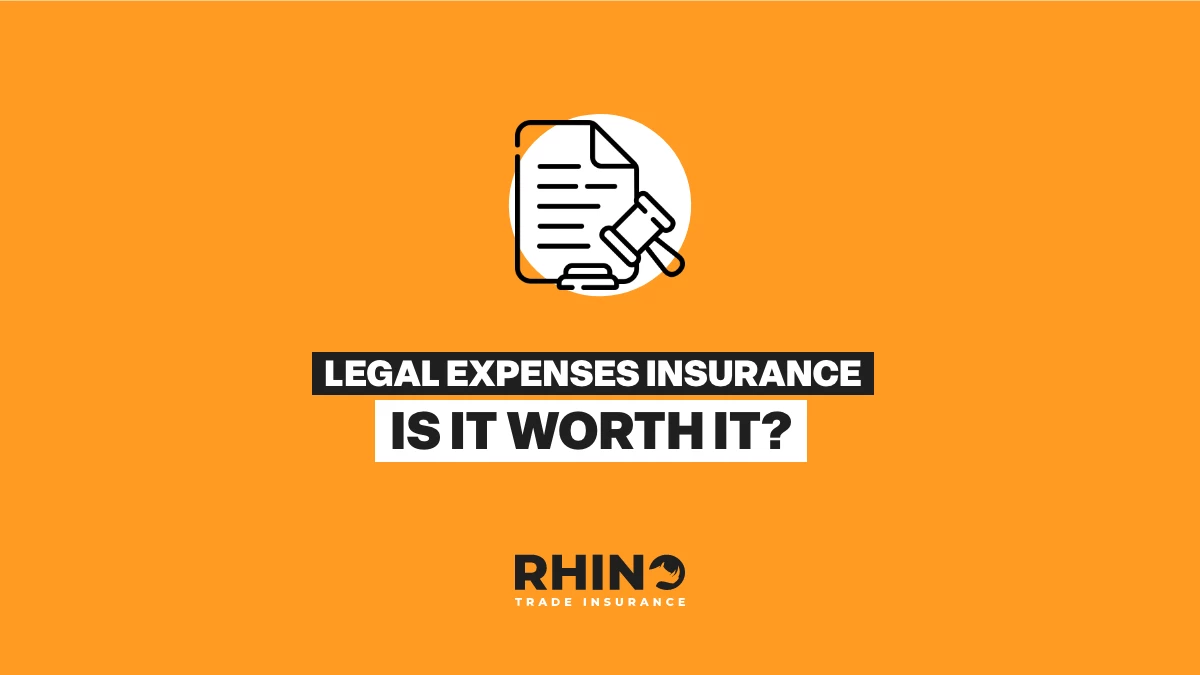
Legal Expenses Insurance – Is it Worth It?
Legal Expenses Insurance for tradespeople explained—what it covers, when you might need it, and how it protects against costly legal fees.
That time may have come when you're wondering whether or not to take on an apprentice. Work-life has gone somewhat crazy these past 18 months. Hence, tradesmen or women across the UK consider passing on their skills and taking on an extra pair of hands. You may be wondering if you need to have a certain level of insurance in place to do so. That's why Rhino Trade Insurance is here today, to help you with a popular question we get asked and whether or not you need to think about Employers Liability Insurance when taking on an apprentice.
Whatever your trade, whether you’re an electrician, plumber, carpenter, bricklayer, heating engineer or your skills lie in something more niche, you may have considered taking on an apprentice to give you a helping hand on-site.
Whilst some tradespeople worry about the commitment of hiring an apprentice, most find it extremely beneficial and never look back. What’s more, it’s a great feeling knowing that your business has given somebody a chance in life.
There’s likely plenty of questions that you have and amongst those, you may well be wondering what happens when it comes to insurance. And because we’re lovely down here at Rhino HQ, we’ve got the answers you need when it comes to training the next generation.
Extra pair of hands
By taking on an apprentice, you immediately get a fresh pair of hands to help on-site. And, although they won't be qualified yet, this could fundamentally help with completing jobs quicker (which is a godsend in this current bullish trade market we find ourselves in). We hear many tradespeople saying the phrase "we would rather under-promise and over-deliver", and with an apprentice, you might just find yourself with delighted customers if you start completing jobs quicker than scheduled!
There's a skills shortage in the UK!
For years, it's been known that we have had a skills shortage, and it doesn't look to be slowing down. With an ageing trade workforce and a new generation of tradespeople playing catch-up. That's why taking on an apprentice can be a very cost-effective way of bringing in new skills to your business and the trade community.
Any tradesperson can take on an apprentice, though you will be expected to fulfil a handful of requirements before employing them. When thinking of apprentices, there are some minor differences in apprenticeship programmes across different organisations. Usually, you will find that apprenticeship programmes generally follow a simple flow:
When deciding whether or not to hire an apprentice, just remember that if the person interested is over the age of 24, their training may only have a portion paid for. If your apprentice is 18 or older, they will usually have an apprenticeship that lasts longer than 12 months up until 3 or 4 years, depending on the time it takes to be qualified/ time-served.
During an apprenticeship, it's worth knowing what's involved to ensure you are following the correct procedure. During an apprenticeship, the employer will agree to employ someone for the term of their apprenticeship and support them in their training for that period of time. Secondly, the apprentice will agree to follow instructions, attend off-the-job training sessions, usually on day-release. If you sell your trade business in the middle, the new owner is obliged to honour the apprenticeship contract. You must also remember to issue the apprentice with an employment contract, which includes all the usual rights a regular employee would have.
Because of the above, it's crucial for any tradesperson or business looking to take on apprentices to have Employers' Liability Insurance in place. Let's take a look at why.
As an employer, it's your legal responsibility to ensure that all of your staff members have a safe working environment, free from any risks and hazards that could result in injury or a claim. You must always make sure to have health and safety guidelines in place and provide your staff with training so that any and every precaution is taken to ensure safety in the workplace.
That's also why you should have Employers' Liability Cover in place, especially before taking on an apprentice. Should you have someone around the worksite who is untrained, that could present a significant risk to you and your business. If one of your staff members is injured or becomes ill due to work undertaken, they can claim against you.
If you hired an apprentice, for example, who received insufficient training and goes on to injure themselves, they could well file a claim against you and your business.
What's more, if you employ any staff, it is a legal requirement for any business to hold Employers' Liability Insurance. What's even worse is if you are caught without this insurance, you could be fined up to £2500 for each day you go uninsured! And god forbid the amount you'd have to pay should a claim be made against you.
So if you have an apprentice whipper snapper bouncing around the site with you and you're worried about them, you may be wondering which level of cover is needed. Thankfully, we love helping our fellow tradesmen and women out, so should you need to question anything, we are on hand six days a week. Contact our team of insurance experts for a quick and easy answer. They have years of experience with tradespeople all over the UK and are more than happy to solve any issues you may have, making sure your cover is the right one for your business!
Legal Expenses Insurance for tradespeople explained—what it covers, when you might need it, and how it protects against costly legal fees.
Worried about a tax investigation? With HMRC cracking down in 2025, Tax Enquiry Insurance from Rhino gives UK tradespeople expert protection and peace of mind.
Rhino Trade Insurance CEO Troy Stevens joins industry leaders at the House of Commons to discuss the rising issue of tool theft—highlighting its impact on UK tradespeople and the importance of awareness and protection.
Tell us your trade and get a tailored insurance quote for your business in seconds
Our team of experts are available to talk to Mon-Fri 08.30-17.30 and Sat 10.00-14.00

